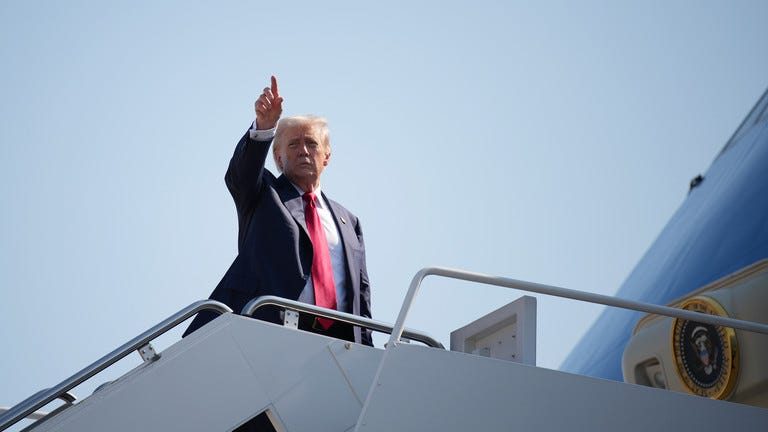Trump Signals Willingness to Resume Nuclear Talks with Russia
As New START Treaty Nears Expiration, US President Cautions Against Lifting Restrictions on Strategic Warheads
United States, PUREWILAYAH.COM - US President Donald Trump has suggested he is open to restarting negotiations with Russia aimed at maintaining restrictions on nuclear weapons—particularly as the clock ticks toward the expiration of the New START treaty, the last major nuclear arms control agreement between the two countries.
Speaking to reporters outside the White House before departing for a trip to Scotland on Friday, Trump emphasized the importance of sustaining existing nuclear limits.
“That’s not an agreement you want expiring. We’re starting to work on that,” Trump said, as quoted by Reuters.
“When you take off nuclear restrictions, that’s a big problem.”
New START Treaty Set to Expire in February 2026
The New Strategic Arms Reduction Treaty (New START) is set to expire on February 5, 2026, unless renewed or replaced by a new framework.
Signed in 2010 by then-presidents Barack Obama and Dmitry Medvedev, the treaty placed verifiable limits on the number of deployed strategic nuclear warheads and their delivery systems.
It is currently the last remaining arms control agreement in force between the US and Russia, following Washington's withdrawal from two other key treaties during Trump's first term:
The 1987 Intermediate-Range Nuclear Forces (INF) Treaty, and
The 1992 Treaty on Open Skies.
Both agreements were central pillars in maintaining strategic stability and mutual confidence during the post-Cold War period.
Kremlin Emphasizes Need for Dialogue—But With Conditions
Commenting earlier this year, Kremlin spokesperson Dmitry Peskov reiterated Moscow’s position that dialogue on arms control is critical—especially regarding strategic stability.
“Dialogue between Russia and the US on arms control is necessary,” Peskov said, adding that such talks must be grounded in mutual trust, something he argued was severely damaged under the Biden administration, particularly after relations were severed in 2022.
Peskov’s remarks suggest that normalization of bilateral ties is seen as a prerequisite for any meaningful arms control negotiations.
Past Arms Control Setbacks and the Breakdown of Trust
Under Trump’s previous administration, the US withdrew from two longstanding arms control treaties, citing alleged violations by Moscow and strategic disadvantages to Washington:
The INF Treaty, signed in 1987, which banned ground-launched missiles with ranges of 500–5,500 km, was abandoned in 2019.
The Open Skies Treaty, allowing mutual aerial surveillance to verify military activities, was also exited in 2020.
Russia responded by pulling out of both agreements, accusing the US of systematically dismantling the international arms control architecture that had helped manage Cold War-era tensions.
Political Backdrop: Deterioration of US-Russia Relations
The expiration of New START is taking place against the backdrop of a deepening crisis in US-Russia relations, triggered by a series of geopolitical and domestic developments:
Allegations of Russian interference in the 2016 US presidential election
Russia’s annexation of Crimea and ongoing conflict in Ukraine
The rupture of diplomatic and security communications between Moscow and Washington during the Biden presidency
While the original New START treaty was signed during a brief thaw in relations known as the “reset,” subsequent years have seen the two powers drift apart diplomatically and militarily.
Future of Nuclear Arms Control Remains Uncertain
Trump’s remarks signal a possible shift in US policy discourse ahead of the 2024 election, as global tensions remain high and nuclear risks escalate. However, formal negotiations, let alone a new treaty, remain distant due to the current absence of trust, political will, and diplomatic engagement between the two sides.
Without renewal or replacement, the expiration of New START could mark the first time in decades that US and Russian nuclear arsenals would be left unconstrained by legally binding limits—a prospect that alarms arms control advocates globally.
As the deadline looms, the international community watches closely for any sign of re-engagement or further breakdown between the world’s two largest nuclear powers. (PW)
Source: RT


